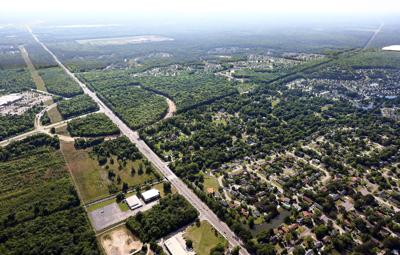A housing developer whose project was stopped by Charleston's new flood rules is suing the city for $8 million.
Builders of the Harmony project — a group of more than 200 homes slated for the flood-prone Church Creek basin in outer West Ashley — were told by city staff in late January their building plan no longer complied with the city's rules.
After three years of flooding events in the area, where a narrow creek drains thousands of acres, builders now have to compensate for elevating home lots with fill dirt by digging even bigger retention ponds to hold displaced water.
A consultant for Charleston previously pegged fill dirt — a cheap way to raise homes to federally required heights — as a driver of the flooding on the outer edges of the city.
But the Harmony builders, whose project was initially approved in 2015, say in a complaint filed Aug. 12 that the city's policy changes have been "arbitrary and capricious," and have robbed the company of its development opportunity.
They argue the rules of four years ago should apply to the project, not the new standards.
The city did not respond to the suit directly but said protections from flooding is the focus.
"While the city will not comment on the pending litigation, the city’s first objective will continue to be the protection of neighborhoods and businesses, whether existing now or to be developed in the future, from the many adverse impacts caused by flooding," Daniel McQueeny, an attorney for Charleston, said in an email.
The city has not yet filed an answer to the complaint in state court in Charleston County.
It comes as little surprise that Harmony has chosen to challenge the rules. The developers of the 166-acre housing tract near Glenn McConnell Parkway and Bees Ferry Road are saying Charleston has effectively "taken" their land by over-regulating how they may use it, a common argument among builders and landowners protesting land-use rules.
Other than the Harmony project, nine other projects have to comply with the new Church Creek rules, city spokesman Jack O'Toole said. One is the final phase of the Middleborough Condominiums, a project that's been in the works since 2007.
The possibility of litigation in that case worried some City Council members so much that they floated a special exception to the rules for the Middleborough project, but that suggestion was ultimately scrapped.
As of Wednesday, the Middleborough builders hadn't filed a court action protesting the building rules.










